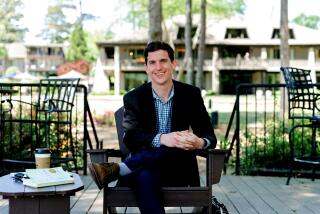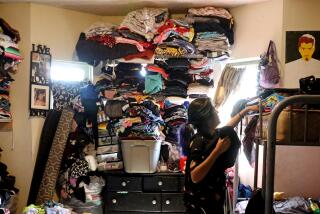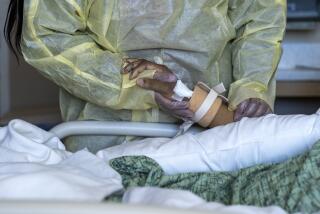When coronavirus invaded their tiny apartment, children desperately tried to protect dad
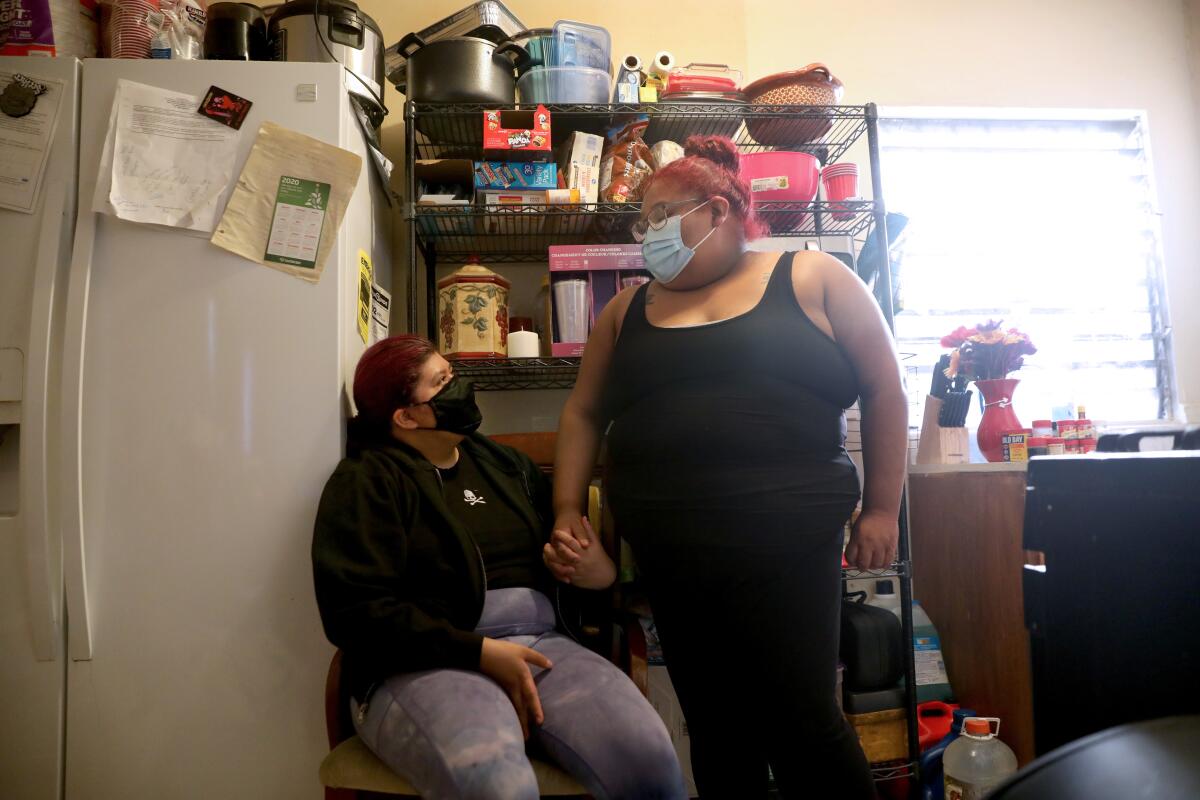
- Share via
To ward off the deadly virus that had invaded his small apartment, Jose Guadalupe Zubia slept in a surgical mask and cracked open a window beside his bed.
Two of his sons, who slept in the living room with their father, also kept their masks on all night. One pulled the covers over his head, hoping to keep the infection from spreading.
Jose’s two daughters shut themselves in the bedroom they shared. When they used the apartment’s only bathroom, they wiped everything down with Lysol.
The sons and daughters all tested positive for the novel coronavirus in October. Jose, a 59-year-old mechanic, was the only one who tested negative.
The children were determined to protect their diabetic father. But they lived crammed together, along with two dogs, in a one-bedroom apartment in South Los Angeles with two beds occupying much of the living room. Before they got sick, one of Jose’s grandsons often spent the night, too.
“It’s easily spread as it is. When you’re living in such a small spot, it’s even harder to keep yourself away from somebody,” said Joanna, 29. “What could we do?”
Like many Latino families, the Zubias live in overcrowded housing. In South L.A., where most residents are Latino or Black, nearly 1 out of every 5 homes is overcrowded — typically defined as more than one person per room.
Favian, 28, worked in plumbing. Joanna made $17 an hour at Food 4 Less. Jonathan, 26, was in between jobs. Priscilla, the youngest at 20, had left Cal State L.A., where she was studying psychology, because of a heart condition. Their father pulled in a couple of hundred dollars each month in freelance mechanic jobs.
Nearly all their combined income went toward the rent of just over $1,000 a month.
Jose dreamed of one day buying a home, but with a median price of more than $700,000 in L.A. County, everywhere he looked seemed out of reach. None of the children could afford to move out. Only Jose’s oldest child, Travian, 30, lived on his own.
So the Zubias had made do with an arrangement that was uncomfortable but tolerable — until the coronavirus hit.
In Los Angeles County, there is little mystery to the heaviest spread of the virus. Where the crowding is worst, the pandemic hits hardest: the Eastside. Southeast L.A. South L.A.
Many people in these areas have jobs that require them to work outside their homes.
“Once the virus is introduced into a crowded household, then it’s really impossible to prevent the further spread,” said Dr. Lee Riley, a professor of epidemiology and infectious diseases at UC Berkeley. “There’s not much that can be done.”
The Zubia family was no stranger to tough times and tight living conditions. Jose immigrated to California from the Mexican state of Chihuahua when he was 18.
When Joanna was 5, the family moved from California to Georgia, where Jose worked in a textile factory.
After his wife left him, Jose struggled to care for the kids and pay the rent. After their water and power were shut off, they used a neighbor’s hose to fill buckets of water for baths.
When they moved back to California and stayed with Jose’s brother in Burbank, the four youngest kids slept on the living room floor. Jose and Travian slept in a van behind the house.
In 2005, as soon as Jose had saved enough, they moved to the one-bedroom unit in a two-story apartment building on Western Avenue, in Manchester Square. Joanna and the three boys slept in bunk beds in the living room, and Priscilla, who was 4 at the time, shared the tiny bedroom with her dad. The little girl would fall asleep holding his ear.
As they got older, the women took the bedroom and the men the living room.
Joanna and Priscilla share a twin bed. The distance from the wall to the closet is about 10 feet. The other two walls are about nine feet apart. Joanna has counted.
“It’s a small room — we can’t even be away from each other,” Priscilla said.
The purple painted walls were Priscilla’s choice. The fluffy carpet and pillows were Joanna’s pick. The closet held their clothes and also their father’s.
In the living room, a few steps from the front door, Favian shared a bed with his son on the weekdays. Inches away, Jose’s bed nearly jutted into the kitchen. Jonathan slept on the floor beside the TV. One of the few decorations on the wall was a crucifix.
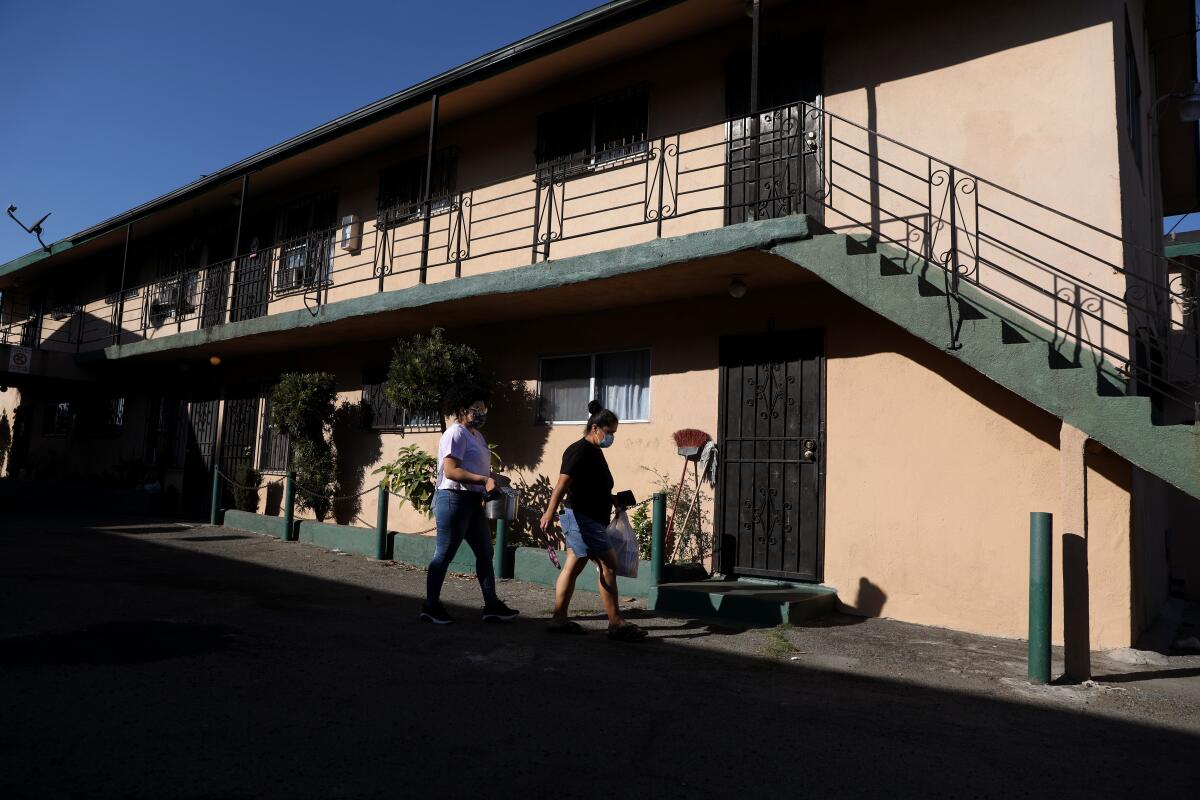
They made space where they could. The dining table was pushed against the kitchen wall and the refrigerator next to the counter. Dishes were stored on the table or in the oven. Shoes went in a red hanger behind the front door.
The family knew how to navigate around one another. Sometimes, Joanna was the first out the door, to start her shift at Food 4 Less at 4 a.m. Soon after, Favian would get up and drive to Travian’s home to carpool to their plumbing jobs.
Jose would make eggs, beans and potatoes for whoever was still around before heading to the alley next to the apartment building, where he spent the day working on cars and playing Los Bukis on his speaker. He loved music and he loved to dance, especially with his grandchildren.
Inside the apartment, a narrow, tiled hallway led to the one bathroom. The kids grew used to their dad rapping on the door, even if someone had just stepped inside.
“Tengo que usar el baño, apurate,” he’d shout, as he did a dance outside, shifting from foot to foot. “I have to use the bathroom, hurry up.” In their rush to exit, the kids would wash their hands in the kitchen sink.
Their living situation was ripe for disaster. Joanna had been recently diagnosed with diabetes, and Priscilla had her heart condition.
The eldest brothers, who drove to work together, were the first to get sick. Travian seemed to have a cold. Soon, Favian couldn’t taste anything.
In mid-October, when the apartment became a hotbed of infection, it felt like it was shrinking even smaller.
Jose tried to keep his distance, but he wanted to care for his kids. He brewed tea with ginger, red onion and lemon and made sure they took their medicine.
To get more circulation, he left the front door open, with air passing through the locked and perforated metal security door. His children worried.
“Where can I take him?” Joanna thought. “What can I do just to keep him away?”
Eventually, Jose got sick. He told a neighbor he felt like he was dying, but he never told his children.
By now, Joanna’s condition had worsened, the pain in her lungs so sharp she couldn’t sleep. She didn’t realize what was going on with her dad until she steamed up the bathroom to try to open up her lungs. In the living room, she saw Jose moaning and whimpering in his sleep.
Priscilla checked his temperature: 105.1. His lips were chapped, and he was quivering.
They dropped him off at Ronald Reagan UCLA Medical Center, where Priscilla had undergone heart surgery last February. They prayed that he would be OK.
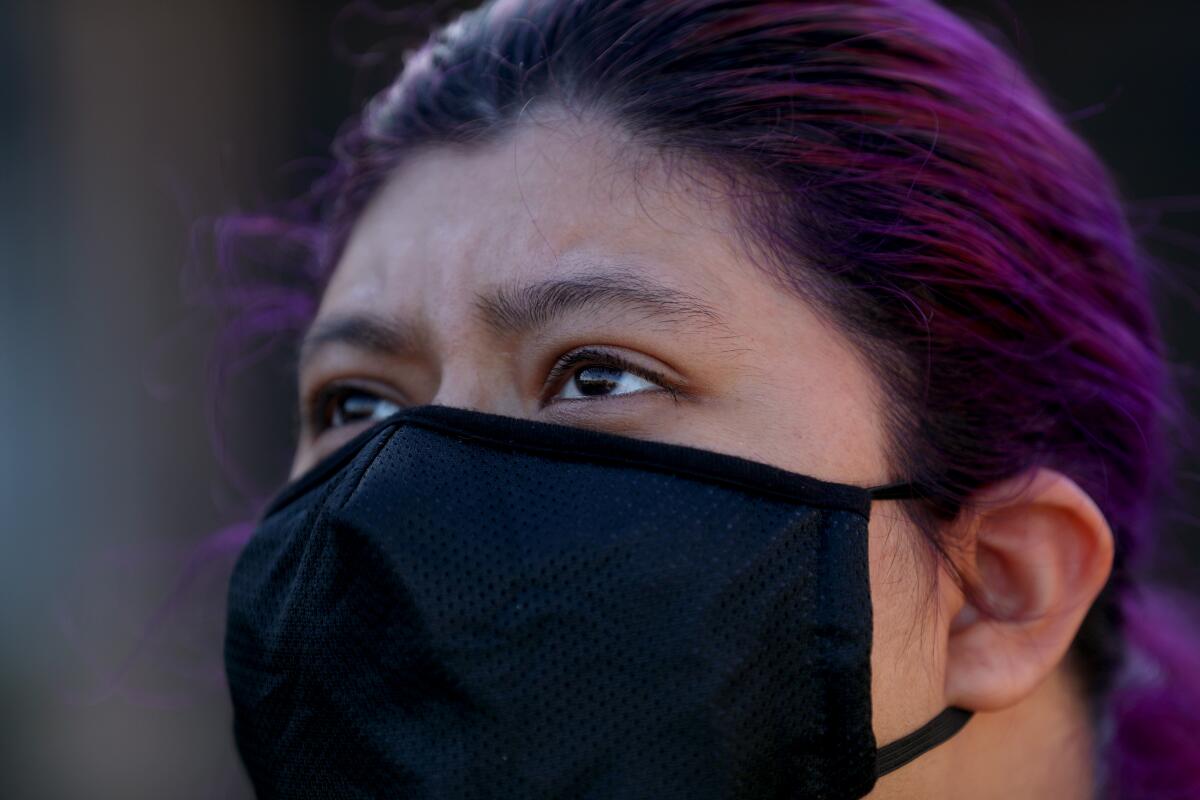
Thanh Neville, a doctor in the intensive care unit, began keeping a journal after the pandemic started. She wanted to record the extraordinary emotional and psychological experiences she was having.
“This ICU week is particularly horrible,” she wrote on Nov. 1. “During my last stint, I had discharged the last Covid patient, but this week, there seems to be a new patient transferred to the ICU with Covid every day. Today, we admitted a patriarch of a family of 5 children (a single father who lives with 4 of his adult children).”
Jose had a dangerously low oxygen level, and his chest X-ray showed advanced COVID-19 pneumonia.
He agreed to enroll in a clinical trial, saying, “Even if I don’t benefit from this study, I hope the information will help others.”
Overnight, he was placed on a ventilator, and Joanna was admitted to the same hospital. “An American tragedy,” Neville wrote in her journal.
Neville asked if the family had socially distanced. Joanna started to cry.
“We live in a small house. It’s hard,” Joanna replied. The ICU was the first time in her life she had her own room.
Neville knew about living in an overcrowded home. One of eight children, she shared a room with two sisters and slept on a bunk bed until she left for medical school.
“I know what it’s like to not have much,” Neville said. She and her family were refugees from Vietnam. “The odds were up against this family.”
On Nov. 3, Neville arranged for Joanna and her father to be placed in adjacent rooms. The physician sweated through her PPE as she helped move the two beds and slide open the glass door as far as it would open so Joanna could see her dad.
Joanna called out to him, trying to provide what small comfort she could.
“I’m OK,” she told him in Spanish. “You’re going to be OK, too. We’ll see you at home. I love you.”
By Nov. 25, Joanna had been discharged, but Jose was failing. The hospital offered one family member the chance to see him a final time.
The siblings agreed it would be Priscilla. She was nervous as she put on her PPE. Inside, she held her father’s hand.
“He felt so cold,” Priscilla recounted, her voice breaking. “He’s never felt cold.”
She spent an hour with her dad. After she left the room, she could see his oxygen levels dropping. He died a few minutes later.
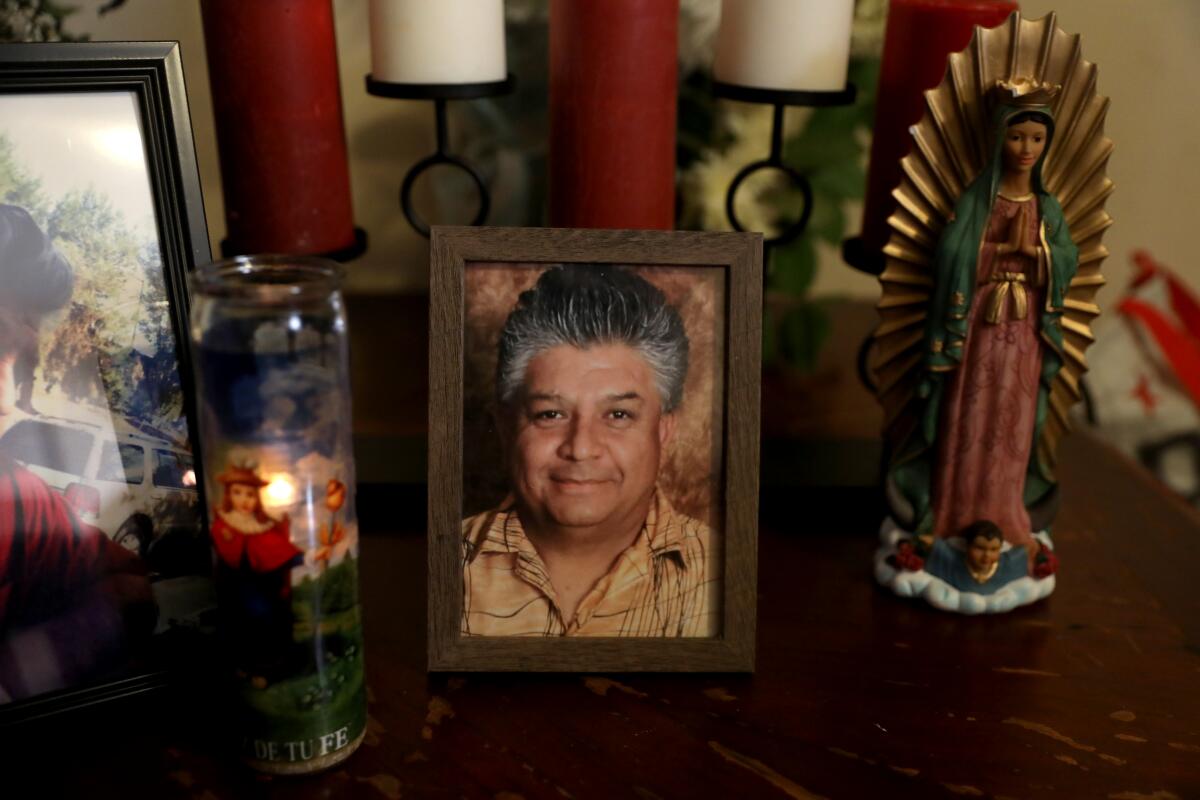
When Dr. Neville spoke to the family by phone, she learned exactly how small their apartment was.
“That’s when you realize social distancing and working from home are privileges not everyone has,” she said.
The family confided their financial worries. They didn’t know how they would pay their rent. They were trying to raise money for their father’s burial.
Joanna wasn’t able to return to work because of shortness of breath and headaches. She feared the day she did go back. What if she got the virus a second time and brought it home?
She was already wrestling with guilt — guilt that she had survived, guilt that her father hadn’t.
“If I wasn’t feeling so sick, I could have been more aware of my father, taking care of him,” she said.
Neville reached out to the philanthropists behind the UCLA Angel Fund and was able to get three months of the family’s rent covered.
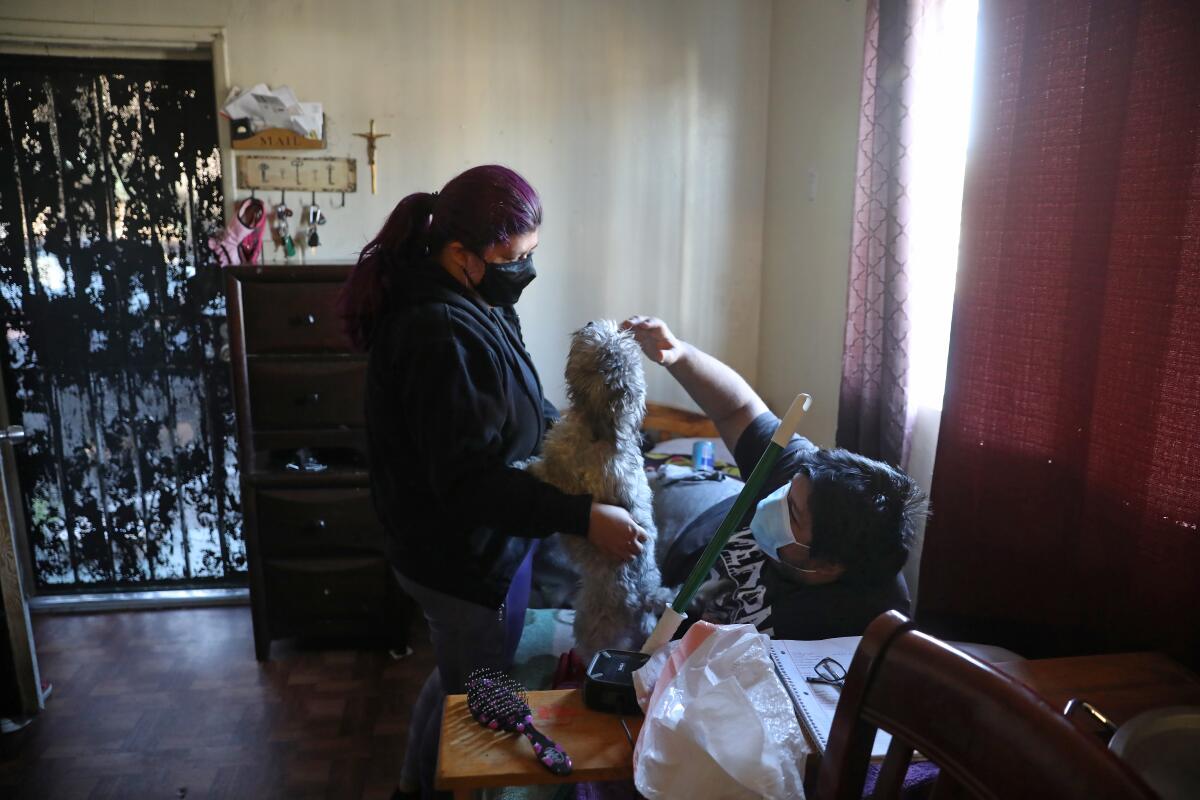
Now there are four people left in the small apartment. They got rid of one bed and plan to get bunk beds for the living room, where Favian and Jonathan still sleep.
The dining room table, moved to the spot where Jose’s bed once was, is an altar. Beside the Virgin Mary are photos of Jose and his children. In one, the proud father smiles and holds tight to baby Priscilla.
It’s one of the few photos in the apartment. Jose never wanted to put much on the walls.
“We’re not going to be here forever,” he reminded his children, always hoping to move to a bigger place someday.
Times staff writer Ryan Menezes contributed to this report.
More to Read
Sign up for Essential California
The most important California stories and recommendations in your inbox every morning.
You may occasionally receive promotional content from the Los Angeles Times.

